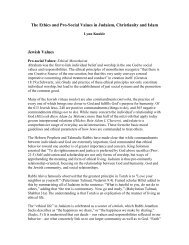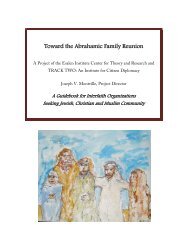Reconciliation as Realpolitik - Abrahamic Family Reunion
Reconciliation as Realpolitik - Abrahamic Family Reunion
Reconciliation as Realpolitik - Abrahamic Family Reunion
Create successful ePaper yourself
Turn your PDF publications into a flip-book with our unique Google optimized e-Paper software.
388<br />
Joseph V. Montville<br />
The Project on Justice in Times of Transition became a moveable<br />
consultation in steady demand. Czech President Havel and Hungarian<br />
President Goncz were strong supporters of the Justice Project <strong>as</strong> a<br />
mechanism for reconciliation. The Project w<strong>as</strong> invited to South Africa by<br />
Nelson Mandela to <strong>as</strong>sist in a post-election healing process, paving the<br />
way for creation of the South African Truth and <strong>Reconciliation</strong> Commission.<br />
In 1997, it convened a meeting in London of significant leaders of<br />
the Muslim, Serbian and Croatian communities in Bosnia that the participants<br />
believe w<strong>as</strong> an important contribution to the building of alliances<br />
in support of the civilian goals of the Dayton peace accords.<br />
The Justice Project also mounted an extraordinary public meeting in<br />
the previously much-bombed Europa Hotel in Belf<strong>as</strong>t in June, 1995. The<br />
gathering brought Catholic and Protestant politicians and militants together<br />
with British and Irish cabinet ministers. Poets and writers evoked<br />
the tragic p<strong>as</strong>t of Ireland with a poignancy that riveted the audience. It<br />
w<strong>as</strong> an experience of profound mourning. Several of the Northern Ireland<br />
participants in the Belf<strong>as</strong>t meeting took part in the negotiations leading<br />
to the Good Friday peace agreement in 1998.<br />
Contrition and Forgiveness<br />
Clearly one of the most daunting t<strong>as</strong>ks in the psychodynamic approach to<br />
international conflict resolution is to persuade victimizers or their descendants<br />
to offer meaningful, unambiguous and unqualified apology to<br />
the victimized group or nation. There have been inspiring c<strong>as</strong>es such <strong>as</strong><br />
President Yeltsin's initiative with the Katyn documents, Chancellor<br />
Vranitsky's speech to the Austrian people, and President Walesa's formal<br />
apology to the Jewish people for Polish anti-Semitism and complicity in<br />
the Holocaust offered in the Israeli Knesset and other examples at lower<br />
or non-officiaIlevels (Montville 1989, 1993).<br />
Beyond the fact that meaningful apology requires moral courage,<br />
there is the fear that the victimized individual, group or nation might use<br />
the apology <strong>as</strong> a weapon to exact crippling reparations or to visit political<br />
revenge upon the leaders or body offering the apology. Many observers<br />
of the Turkish-Armenian c<strong>as</strong>e believe one of the obstacles to unambigu-<br />
<strong>Reconciliation</strong> <strong>as</strong> <strong>Realpolitik</strong><br />
389<br />
ous acceptance by Turkey of responsibility forthe 1915-1916 m<strong>as</strong>sacres<br />
of Armenians is the fear that Armenians would demand m<strong>as</strong>sive financial<br />
compensation. An official of the Russian Foreign Ministry who supported<br />
a Katyn-style turn-over of incriminating Politburo documents on<br />
Stalin's Baltic annexation decisions told this writer in April 1994 that<br />
Moscow could not do so because of fears that Latvia and Estonia would<br />
use the aCknowledgment to justify the forced repatriation of their large<br />
Russian-speaking minorities.<br />
Despite the difficulties in carrying out contritiOn/forgiveness transactions<br />
between perpetrators and their victims, there are signs that the idea<br />
is becoming more powerful in the public discussion of the resolution of<br />
protracted ethnic and sectarian conflict. The American writer, Cynthia<br />
Ozick, joined the debate in the wake of the murder of Muslim worshipers<br />
by Baruch Goldstein, a deranged Israeli settler from Brooklyn, at the<br />
Tomb of the Patriarchs in Hebron in February 1994. In an op-ed piece in<br />
the "New York Times," Ozick urged contrition <strong>as</strong> a primary <strong>as</strong>sertion of<br />
effective leadership, an example of the political power of sorrow, shame<br />
and grief.<br />
What is required...<strong>as</strong> an element of realpolitik is an understanding<br />
that mutual contrition, even more than the<br />
resolution of issues of acreage and border patrols, must<br />
be the next step in the [Israel-Palestinian] peace process<br />
.... Hardheaded politicos will no dOUbt scoff at the notion<br />
of mutual contrition <strong>as</strong> a way of...enhancing the negotiations.<br />
They will think it too soft a proposal,<br />
smacking of the useless high ground, unserious, devoid<br />
of pragmatism. But no way ... can be more serious, more<br />
allied to truth-telling, more effective and more profoundly<br />
practical (Ozick March 2, 1994, AI5).<br />
No less a student of the meaning of Jewishness in the modem era than<br />
Hanna Arendt (1958) wrote that forgiveness w<strong>as</strong> essential to human<br />
freedom "Only through this constant mutual rele<strong>as</strong>e from what they do<br />
can men remain free agents, only by constant willingness to change their<br />
minds and start over again can they be trusted with so great a power <strong>as</strong><br />
that to begin something new." Lawrence Weschler, a staff writer for




